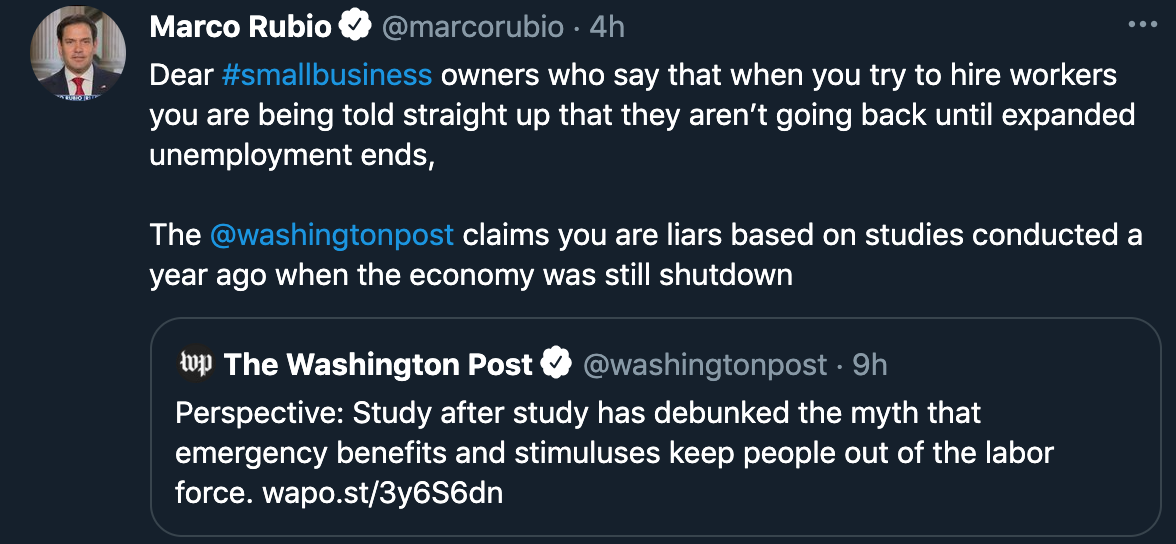As an extension of the fast-food beat, I’ve ended up writing a lot of about labor. And how hard people are working to not get by. And how that battle strikes at our core self-perceptions.
Last week, I wrote about how unemployment benefits and expanded pandemic assistance are being blamed for a workforce shortage in the United States for The Washington Post. The argument in some circles goes that workers would rather stay home and collect government checks than work. And that the rest of us are paying the price literally and economically.
The problem is that it’s generally not true, has never really been true, and is especially not true right now. I get into how little pandemic assistance is actually helping jobless Americans make ends meet. For example: Of the recipients of jobless benefits with children, roughly 75 percent reported not having enough food for their children either sometimes or often.
Of course, if there is a reason that people aren’t going back to certain terrible jobs, it’s largely because the jobs are terrible and don’t provide enough to get by on either. And if the past 14 months have proven anything about work, it’s that some jobs are not worth the risk:
It’s an all-time understatement to say the professional lives of service workers and retail employees grew exponentially less sustainable during the past year. Across the country, hourly workers have been tasked with enforcing mask mandates and have been attacked, harassed and even shot at for protecting themselves and other customers from a public health crisis. (Back in August, Illinois took the extraordinary step of passing a law that would make it a felony for someone to assault a worker for enforcing a mask policy.) Workers have labored long hours through supply shortages and shifting and often lax safety protocols, often without hazard pay or basic benefits like sick leave or health insurance, all in the middle of a pandemic.
The piece caught the ire of a few people, including Marco Rubio:
Forgetting the weird part where Rubio claims that workers are actually telling employers that they’re not going to bother working until pandemic assistance ends in September, he throws some misdirection by saying that the data was from last summer.
But here’s the thing: Study after study after study—and not just during the pandemic—shows that the overwhelming majority of Americans on assistance want to work. For the same reasons that most of us do: They prefer the security, benefits, and the basic framework of life with a job over the unsteadiness of government benefits. This “culture of dependence” riff gets applied to every government program, policy proposal, or liberal caricature there is. It was at the heart of Mitt Romney’s infamous 47% remark, which characterized Americans who need government help as failing to take personal responsibility for their own lives.
If there’s one solace, it’s that I got to see people respond to Rubio with their own anecdotes and put blame for the labor shortage on the quality of the jobs available. This is important. If you read enough stories about the glut of open jobs in America and you won’t hear much from the workers—it’s usually the aggrieved business owners.
I wish there was a victory lap to take on this, but the facts aren’t having mcuh effect. The campaign for states to end pandemic assistance early, which started in a few stray GOP governors’ offices last week is now up to 18 states.
And rather than seize on this moment to fix what’s wrong with work, as many as two million people could end up back in jobs that don’t cover their basic needs or offer reasonable protections.
Further reading: Why Restaurant Workers Says They’re Not Returning to Work (Gaby Del Valle, Eater)
Nu, what else?
I joined Christopher Kimball’s Milk Street podcast to talk about American fast-food chains that made it big and then completely disappeared from the map.
I hate to say it, but I loved this extremely length read on the 25-year anniversary of Dave Matthews Band’s seminal dry-hump album “Crash” by Katie Baker.
For something nice and reaffirming, The Sporkful and Nicole Taylor investigates a recipe for peanut butter pancakes written by Rosa Parks on the back of an envelope in a catalogue of the Library of Congress.
No matter where sit, you’ll probably find something objectionable in Matti Friedman’s excellent piece on the current violence in the Levant right now. That’s a good thing.
Have you heard about our referral program? If you refer a new subscriber to The Crunchwrap, I will send you a Taco Bell taco.
Fine print: Crunchy or soft, referrer must have Taco Bell app, void where prohibited.






